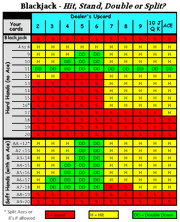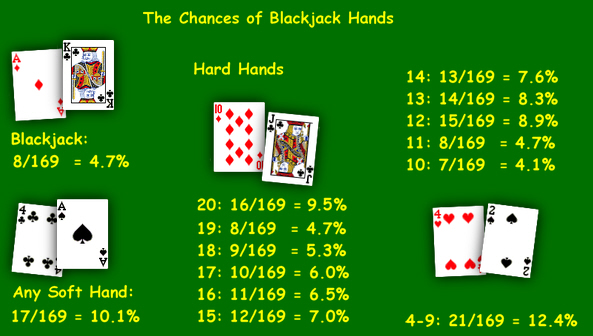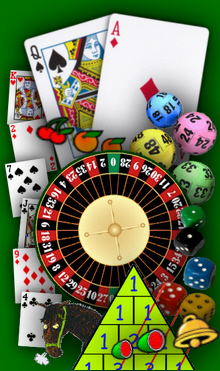 Blackjack - Hit, Stand, Double Down or Split?
Blackjack - Hit, Stand, Double Down or Split?
Blackjack is one of the best loved card games in the world. There are many variations, so if you're new to the game see How to Play Blackjack and Pontoon.
Like any casino game, Blackjack is designed to return a profit to the dealer. However, against a reasonable skilled player this profit is very low compared to most casino games - typically less than 1%. Therefore with skill and a little bit of luck, you could come away with more than you started!
When playing, you have several options: HIT - STAND - DOUBLE DOWN or SPLIT. You might even take Insurance.
|
|
There are several advantages and differences of playing
online Blackjack
compared to the traditional game. Sometimes it's easier to break down the advice on how to approach playing blackjack online into beginner, intermediate and advance play.
You can also test your skills on the wider range of games available at
UK Casinos. Online slots, such as those found at
https://usplayercheck.com/online-slots/ are very popular in the United States of America.
Also available are free blackjack promo codes
| |
|
|

|
Blackjack Quick Guide
DOWNLOAD *PDF
|
HIT, STAND, DOUBLE DOWN or SPLIT?
These calculations are based on EIGHT FULL DECKS mixed together.
This means that cards already drawn will have a negligible effect on the chances of what may yet turn up.
Should I SPLIT?
If your two dealt cards are the same value, this is the first decision you have to make.
Generally it is agreed there are only two card values you should split:
TWO ACES: this gives a soft 12 points which is not much fun. If the house rules let you split your aces, you have a 52% chance that at least one of your hands will give you a Blackjack.
Be aware that some places only pay out 1/1 on a Blackjack after splitting.
 TWO 8s: sixteen is a lousy total to work from, but splitting the 8's gives you a 62% chance that at least one of your hands will give you 18 or even a soft 19. Some people argue that if the dealer is showing 9 or 10, then don't split and hit on your 16. It's your decision!
TWO 8s: sixteen is a lousy total to work from, but splitting the 8's gives you a 62% chance that at least one of your hands will give you 18 or even a soft 19. Some people argue that if the dealer is showing 9 or 10, then don't split and hit on your 16. It's your decision!
After you have split you play both hands separately.
Should I HIT or STAND?
This is THE big decision!
If your points total is 11 or less you MUST hit as your hand will improve and you can't go bust! Once your score is 12 or higher, you have to do some thinking. (If you're holding an ACE, things are slightly different. See the soft hands section.) This is a summary of the advice built up by experts over the years. Look at the dealer's upturned card and then act as follows:
|
|
|
The Dealer's
Upturned card
| |
What you should do |
|
Dealer's chance of going bust! |
| 2 or 3
| |
There's a reasonable chance the dealer will go bust, and he will be lucky if he finishes in the 17-21 zone. If you've got 13 or more then stand.
Hit on 12 or less.
| |
36%
|
| 4, 5 or 6
| |
This is bad for the dealer! Don't risk going bust.
Hit on 11 or less.
| |
42%
|
| 7, 8, 9
| |
The dealer is likely to get a high score, so you have to take more of a chance.
Hit on 16 or less.
| |
25%
|
| 10, J, Q, K
| |
|
21%
|
| ACE
| |
There's a 4/13 (31%) chance of a blackjack against you, plus the dealer has more options to get a score between 17 and 21. As it's likely you'll be beaten it's worth being brave.
Hit on 17 or less.
| |
12%
|
When do I DOUBLE DOWN?
 Aha! This is the question that sorts out the champions from the also-rans.
Aha! This is the question that sorts out the champions from the also-rans.
Everybody has their own opinions, so when playing hard hands (i.e. you don't hold an ace) this is just a guide.
Double Down when...
- You hold 11.
- You hold 10 and the dealer is showing 4, 5 or 6
- You hold 9 and the dealer is showing 5 or 6.
|
|
|
SOFT HANDS!

Suppose you're holding an ACE and a 3, this is called a soft 14. If you hit and get 7, you've got a perfectly valid 21, but if you hit and get 8, then your ACE is worth 1, and your total becomes 12. You're still in the game!
Having an ACE is a very powerful weapon against the dealer providing you know how best to use it.
Here's the basic advice:
- Always stand on soft 19 and soft 20.
- Stand on soft 18 if the dealer shows 7 or 8.
- Hit all other soft hands!
If the rules allow it, you should also Double Down as suggested by this table. (If you can't Double Down then Hit.)
|
Dealer's face-up card |
| Your Soft Hand! |
2 |
3 |
4 |
5/6 |
7/8 |
9/10/ACE |
ACE-ACE = soft 12
ACE-2 = soft 13
ACE-3 = soft 14 |
H |
H |
H |
D |
H |
H |
ACE-4 = soft 15
ACE-5 = soft 16 |
H |
H |
D |
D |
H |
H |
| ACE-6 = soft 17 |
H |
D |
D |
D |
H |
H |
| ACE-7 = soft 18 |
H |
D |
D |
D |
S |
H |
ACE-8 = soft 19
ACE-9 = soft 20 |
S |
S |
S |
S |
S |
S |
|
|
|
S = Stand |
H = Hit |
D = Double Down |
Of course, these are only suggestions to help you! If everything could be accurately predicted, where's the fun?
|
|
|
HOW LIKELY ARE YOU TO GO BUST?

Suppose you're on 14. Any card 7 or below is good, but the six cards higher than the 7 are bad. Therefore if you hit on 14, you have a slightly better than even chance (7/13 = 54%) of improving your hand, and you are slightly less likely (6/14 = 46%) to go bust. 7 is actually the "middle number" or "median" of the card values.
Whatever your hand, you can work out your chances of going bust by considering how many cards (out of the thirteen different ranks available) are against you. For these calculations, ACE always counts as 1 and we're assuming multiple decks have been shuffled together.
| How many points you hold |
11 or less |
12 |
13 |
14 |
15 |
16 |
17 |
18 |
19 |
20 |
21 |
| Number of cards against you |
0/13 |
4/13 |
5/13 |
6/13 |
7/13 |
8/13 |
9/13 |
10/13 |
11/13 |
12/13 |
|
| Your chance of going bust |
0% |
31% |
38% |
46% |
54% |
62% |
69% |
77% |
85% |
92% |
Don't do it! |
|
|
|
INSURANCE
If the dealer's upcard is an ACE, he has a 4/13 (31%) chance of getting a Blackjack. You might be allowed to place an extra insurance bet. This is half your stake, and if the dealer does get Blackjack, it pays 2:1 which will effectively return your whole stake on the hand. However, as the dealer's chance of Blackjack is slightly less than 1/3, over time the casino makes a profit of about 2.5% on insurance bets. Therefore insurance is not generally recommended.
WHAT IS CARD COUNTING?
 If you're playing with a single deck and you see the dealer's upcard is an ace, you know your own chance of receiving an ace is reduced. That's simple!
If you're playing with a single deck and you see the dealer's upcard is an ace, you know your own chance of receiving an ace is reduced. That's simple!
However, you will usually be playing a game where up to 8 decks are mixed together. A blank plastic card is inserted near the bottom of the deck. The shuffled cards are then stacked in a "shoe" from which they are drawn one at a time as required and then discarded. When the blank appears, all the the cards are brought back together, shuffled and then dealing starts from the top again.
Keeping track of what has been played from multiple decks requires a great deal more skill, but it can be worth it. If a lot of low cards have come out (A-9) this means that a higher than usual proportion of 10-value cards are left. This offers a slight advantage to the player, so it's time to raise your bets. By contrast, if a lot of 10 cards have come out, it's better to keep bets low or even stop playing.
Experts have developed several methods of card counting to help you beat the dealer - but be discrete. The dealers don't like it!
If you would like to boost your card counting performance you can always find an abundance of resources online that will increase your odds of success.
Never bet more than you can afford to lose.
Good luck!
|
|
|


|
Blackjack Quick Guide
DOWNLOAD *PDF
|
There are more stats and facts about games here:
Craps - How to play, Chances and Payouts
Blackjack - Hit, Stand, Double Down or Split?
Chances of Card Hands
Crown and Anchor Dice Game
The Betting Guide - and how to work out the Bookie's profit!
Accumulator Bets
The Roulette Wheel ... and how to worry the casino!
The One-Armed Bandit Slot Machine
How many ways can you put a pack of cards in order?
The National Lottery Odds
Kjartan's Games Home Page
Contact/Enquiries
|


 If you're playing with a single deck and you see the dealer's upcard is an ace, you know your own chance of receiving an ace is reduced. That's simple!
If you're playing with a single deck and you see the dealer's upcard is an ace, you know your own chance of receiving an ace is reduced. That's simple!
 Blackjack - Hit, Stand, Double Down or Split?
Blackjack - Hit, Stand, Double Down or Split?

 TWO 8s: sixteen is a lousy total to work from, but splitting the 8's gives you a 62% chance that at least one of your hands will give you 18 or even a soft 19. Some people argue that if the dealer is showing 9 or 10, then don't split and hit on your 16. It's your decision!
TWO 8s: sixteen is a lousy total to work from, but splitting the 8's gives you a 62% chance that at least one of your hands will give you 18 or even a soft 19. Some people argue that if the dealer is showing 9 or 10, then don't split and hit on your 16. It's your decision!
 Aha! This is the question that sorts out the champions from the also-rans.
Aha! This is the question that sorts out the champions from the also-rans.
